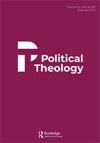The Rupture of Desire: An Interview with China Miéville on Aesthetics, Marxism, and Apophasis
IF 0.4
0 RELIGION
引用次数: 0
Abstract
China Miéville is a writer whose awards and recognitions include a fellowship in the Royal Society of Literature, a Guggenheim Fellowship for fiction, the Arthur C. Clarke Award, the World Fantasy Award, the Hugo Award, the British Science Fiction Award, the Edge Hill Short Story Prize, and more. In 2001 he received a PhD in International Law from London School of Economics. Miéville has long since been active on the intellectual and political Left. He is a founder and editor of Salvage, a journal of revolutionary arts and letters, and an essayist who has written widely on Marxism, art, and politics. His most recent book is A Spectre, Haunting, a work of non-fiction which expounds on the Communist Manifesto. Neal Spadafora: Many people take this religious dimension of Marxism to be a critique, and oftentimes just an outright dismissal, of Marxism; indeed, it is a critique from people on the Left and the Right! Nonetheless, the idea that Marxism sublated Christianity and took some bad aspects of Christianity, namely, trying to immanentize the eschaton, is debated by Marxists. Moreover, if you study Cold War Christianity and its relation to United States foreign policy, you find abundant references to Marx as a leader of a religion with its own sins, sacred texts, and, of course, its own eschaton. Similarly, Enzo Traverso’s Revolution, discusses how Trotsky was so frustrated, owing to his own anti-clerical wishes, that [Vladimir] Lenin’s body was embalmed. As you know, embalmment was imagined as a religious exercise that clashed with Trotsky’s atheism. Now, you take this quasi-religious structure of Marxism to have some positive attributes and aspects. In A Spectre, Haunting you look at workers who requested that they do not be buried Bible in hand, but with the Communist Manifesto in hand. Again, this is a religious practice and I want to hear why you appreciate that. And, perhaps, offer a response to those who say Marxism should be something entirely other than a religion. China Miéville: Well, I suppose there is, broadly speaking, a thin and a thick version of my answer. And the thin version is one of which I think is hardly going to be news to the readers of the journal. One of the things that’s become very prominent in the last few years is the notion that many of our political categories are, indeed, theological categories. And you can invert those terms as well. But the point is, there is no hard line between one and the other. Now, I have an argument with the way this is often formulated – again, I don’t want to overstate that there are certainly exceptions – but this is欲望的断裂:美学、马克思主义与Apophasis访谈
China Miéville是一位作家,其奖项和认可包括英国皇家文学学会奖学金、古根海姆小说奖学金、阿瑟·C·克拉克奖、世界幻想奖、雨果奖、英国科幻奖、Edge Hill短篇小说奖等。2001年,他获得了伦敦经济学院国际法博士学位。Miéville长期以来一直活跃在知识分子和政治左派中。他是革命艺术与文学杂志《打捞》的创始人和编辑,也是一位散文家,广泛撰写了关于马克思主义、艺术和政治的文章。他最近出版的一本书是《幽灵,闹鬼》,这是一部阐述《共产党宣言》的非小说作品。Neal Spadafora:许多人认为马克思主义的宗教层面是对马克思主义的批判,通常只是对马克思主义彻底的否定;的确,这是左派和右派的批判!尽管如此,马克思主义对基督教的扬弃和对基督教某些不好的方面的吸收,即试图将末世制度化,这一观点仍受到马克思主义者的争论。此外,如果你研究冷战时期的基督教及其与美国外交政策的关系,你会发现大量的文献提到马克思是一个宗教的领袖,他有自己的罪恶、神圣的文本,当然还有自己的末世。同样,Enzo Traverso的《革命》(Revolution)讨论了托洛茨基是如何因为自己的反牧师愿望而感到沮丧,以至于列宁的遗体被防腐处理的。正如你所知,防腐被想象成一种与托洛茨基无神论相冲突的宗教活动。现在,你认为马克思主义的这种准宗教结构具有一些积极的属性和方面。在《幽灵党》(A Spectre,Haunting)中,你会看到工人们要求他们不要手里拿着《圣经》,而是拿着《共产党宣言》埋葬。再说一遍,这是一种宗教实践,我想听听你为什么这么欣赏。也许,这是对那些认为马克思主义应该完全不是宗教的人的回应。China Miéville:嗯,我想,从广义上讲,我的答案有一个粗略的版本。我认为瘦版对该杂志的读者来说几乎不会是新闻。在过去几年里,一件非常突出的事情是,我们的许多政治类别实际上都是神学类别。你也可以颠倒这些术语。但关键是,两者之间没有硬界限。现在,我对这种表述方式有一个争论——再说一遍,我不想夸大肯定有例外——但这是
本文章由计算机程序翻译,如有差异,请以英文原文为准。
求助全文
约1分钟内获得全文
求助全文

 求助内容:
求助内容: 应助结果提醒方式:
应助结果提醒方式:


